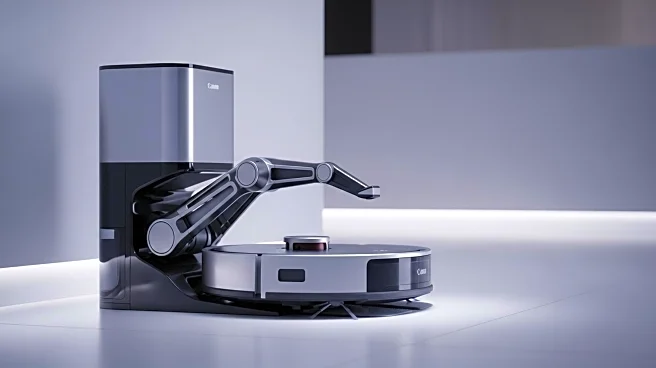What's Happening?
Roborock, a leading manufacturer of robotic vacuums, is celebrating its 11th anniversary by offering a significant discount on its most advanced model, the Saros Z70. Originally priced at $2,599, the Saros Z70 is now available for $1,599 during the Labor Day holiday weekend. This model, which was recently showcased at CES, features an OmniGrip mechanical arm designed to clean various floor types and reach difficult corners. The vacuum's thin profile allows it to clean under low-clearance furniture without the need to move heavy items. Additionally, the Saros Z70 is equipped with the StarSight Autonomous System, which uses cameras and sensors for precise navigation, and boasts a powerful 22,000 Pa HyperForce suction capability.
Why It's Important?
The introduction of the Saros Z70 at a reduced price point represents a significant advancement in home cleaning technology, making high-end robotic vacuums more accessible to consumers. The vacuum's advanced features, such as its mechanical arm and powerful suction, set a new standard for efficiency and convenience in the industry. This move by Roborock could influence competitors to innovate and offer similar discounts, potentially reshaping the market dynamics. Consumers stand to benefit from improved cleaning solutions that require less manual intervention, enhancing the quality of life for busy households.
What's Next?
As Roborock continues to innovate, the company may further expand its product line with additional features and models. The success of the Saros Z70 could lead to increased consumer demand for more advanced robotic vacuums, prompting other manufacturers to develop competitive products. Additionally, Roborock's pricing strategy might encourage other companies to offer similar discounts, leading to a more competitive market landscape. Consumers can expect ongoing advancements in robotic vacuum technology, with potential improvements in navigation, cleaning efficiency, and user convenience.
Beyond the Headlines
The Saros Z70's introduction highlights the growing trend of integrating advanced technology into everyday household appliances. This development reflects a broader shift towards smart home solutions that prioritize automation and efficiency. As consumers become more accustomed to these technologies, there may be increased demand for interconnected devices that work seamlessly together. The ethical implications of increased automation, such as job displacement in traditional cleaning roles, may also become a topic of discussion as these technologies become more widespread.









